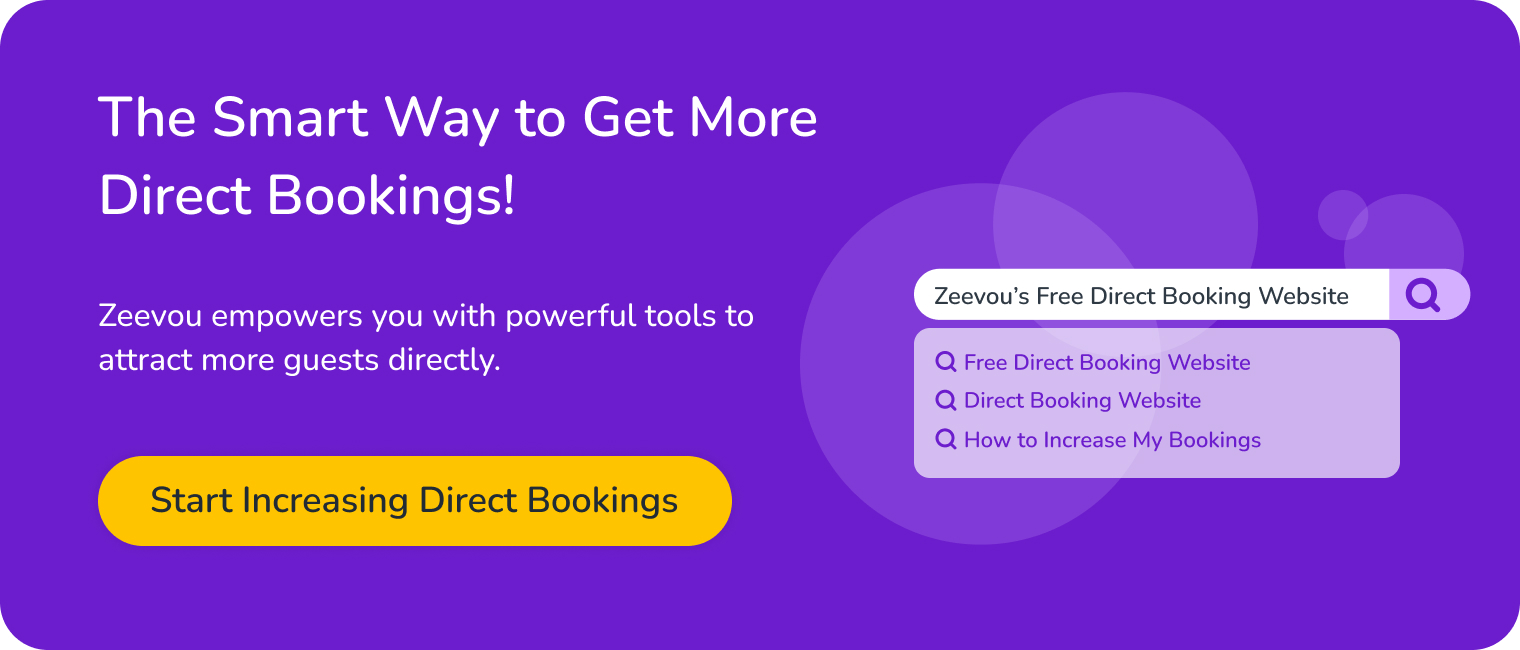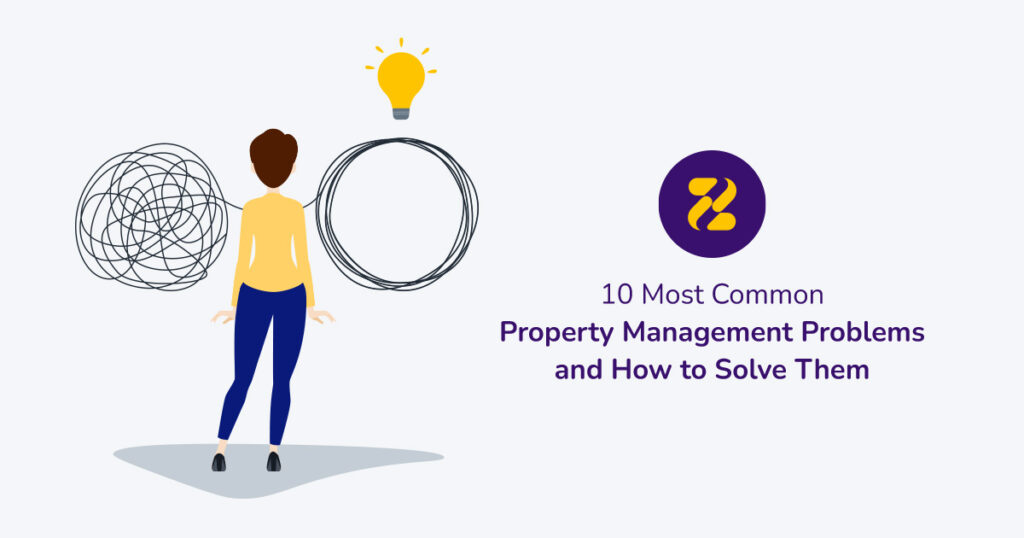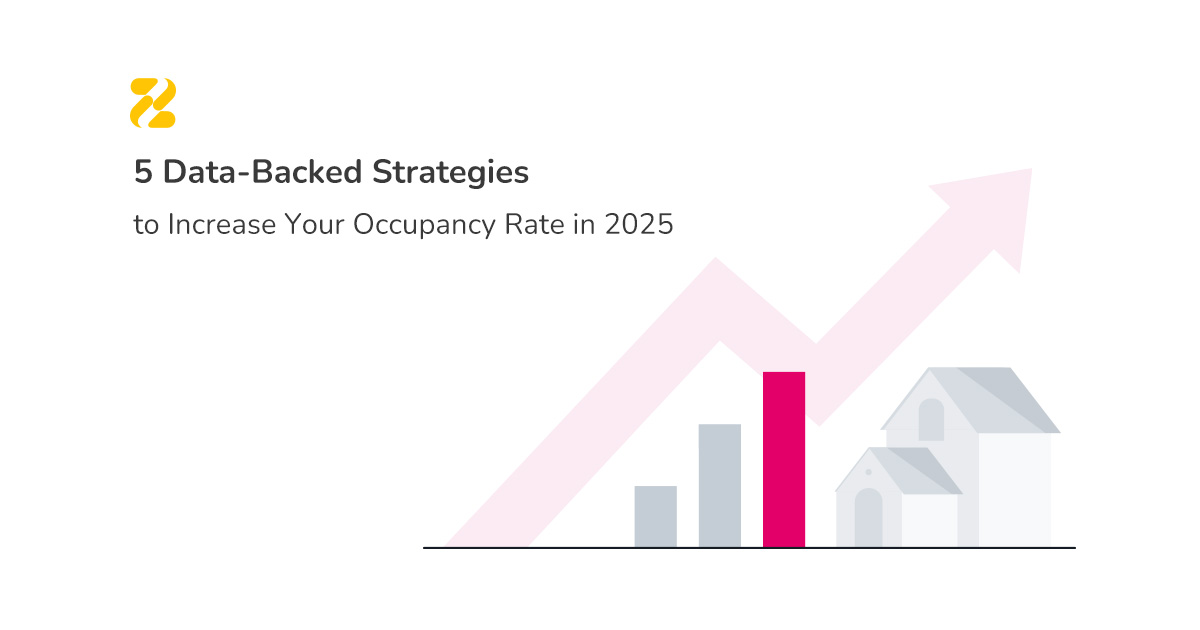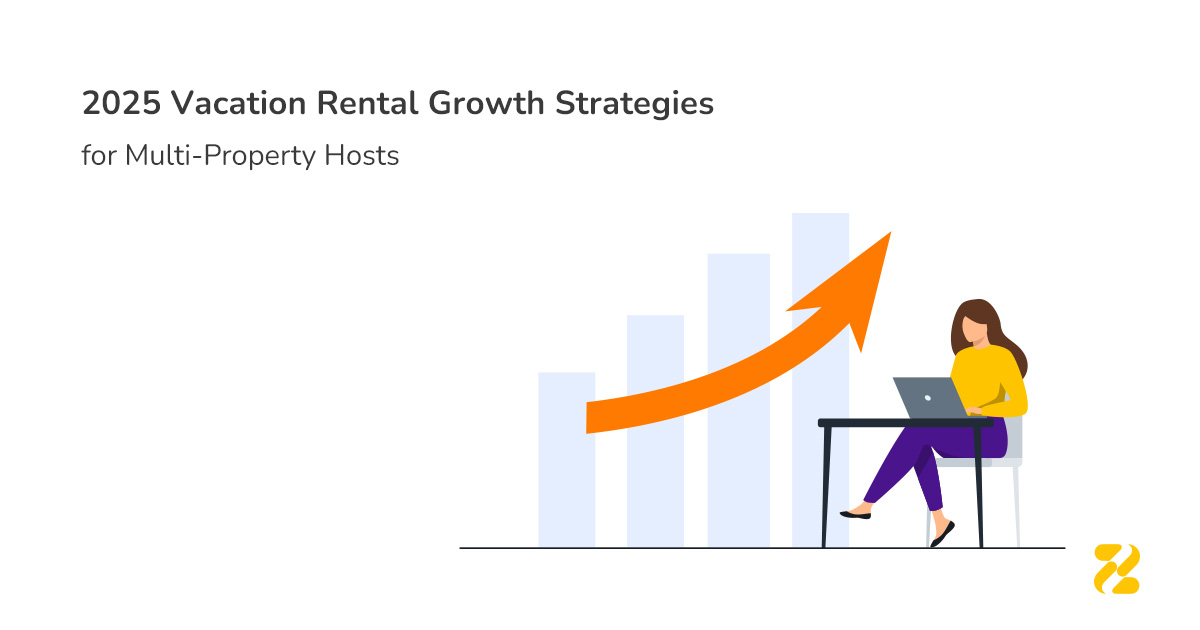Imagine someone telling you about a valuable treasure—but also warning you about the challenges you’ll face to get there. Would you want to know what those challenges are before you start? The same goes for property management. Whether you’re new to short-term rental management or have been in the business for a while, it’s important to understand the common problems property managers face—and how these challenges are evolving with technology, regulations, and guest expectations in 2025.
This post shares insights from experienced property managers and the latest industry trends, offering practical solutions to help you stay ahead and succeed in your property management journey.

Table of Contents
Problem 1: Guests Trashing Your Properties

Just Google the term “Airbnb guest trash house” and find a long list of articles of desperate property managers and landlords sharing their experiences of their guests leaving their houses in unbelievably catastrophic situations.
One of the biggest concerns for property managers is guests leaving properties in poor condition. While security deposits are helpful, especially for short stays, they often fall short for mid– to long-term rentals where damage can accumulate beyond initial coverage.
Solution: Screen Your Guests Before Handing Your Property to Them
It’s tempting, especially in slow seasons, to accept bookings quickly—but don’t skip proper guest screening. Your property is your main investment, so protecting it is critical.
Key steps to screen guests:
- Collect payments securely to reduce chargeback risks. Use trusted payment gateways.
- Always collect a security deposit, even for longer stays—it’s better than nothing.
- Verify guest identity by asking for contact details and ID documents.
- Use your Property Management System (PMS) or channel manager’s built-in booking workflows to automate these checks, whether bookings come via OTA or your direct website.
- If you want to know about this solution in more detail, you’ll find this page helpful.
New in 2025:
Consider integrating AI-based guest verification platforms that cross-check ID documents and booking histories automatically, giving you an extra layer of confidence before approval.
Problem 2: The Constant Need for Enhancing Guest Experience

The UK Parliament has noted a significant increase in short-term rentals across England in recent years, driven largely by the rise of the ‘sharing economy’ and peer-to-peer accommodation services.
Airbnb reported 223,200 active listings between July 2017 and July 2018, with 58% of these being entire properties. More recently, as of September 2024, there are approximately 55,484 active Airbnb listings in London alone, reflecting the continued growth and popularity of short-term rentals. While the total number of listings across the UK is higher, exact figures fluctuate as the market evolves.
A glance at these figures clearly shows just how fiercely competitive the short-term rental market has become. Given this landscape, it’s no surprise that continuously improving the guest experience ranks as one of the top challenges property managers face today.
If you do not make a consistent effort to enhance the quality of your service(s), you risk losing both potential and returning guests to competitors.
With the short-term rental market growing ever more competitive, it is essential to keep improving guest experiences. Personalised and automated communication plays a vital role in making guests feel valued.
Solution: Automate and Personalise the Guest Experience for Greater Satisfaction
As discussed earlier, collecting accurate guest contact details during the booking process is essential. In particular, if your booking system is designed to collect your guests’ real email addresses, you can maintain contact with them long after their stay. This ongoing communication is vital for building loyalty and delivering the most personalised experience based on their preferences.
However, while your booking system must be precise, it should also be as streamlined and user-friendly as possible. Complex or lengthy booking procedures deter potential guests—even if your property is exceptional, a complicated experience can send them elsewhere.
Contemporary property management systems harness AI to personalise guest interactions in real time, tailoring messages and offers based on individual behaviours and preferences. This not only boosts guest satisfaction but also fosters repeat bookings and long-term loyalty.
Moreover, automation efficiently handles routine tasks—such as sending booking confirmations, reminders, and follow-up emails—freeing up property managers to focus on attending to guests’ unique needs and delivering a truly memorable experience.
By combining a smooth, accurate booking process with AI-driven personalisation and automation, you create a guest journey that feels effortless, engaging, and tailored—leading to happier guests and a more successful property management business.
Problem 3: Increasing Direct Bookings in a Competitive Market

While platforms like Airbnb, Booking.com, and Vrbo offer significant exposure, they come at a cost—typically 15–30% in commission fees. As the short-term rental market becomes increasingly competitive, relying solely on these channels can significantly erode your profit margins. To maximise earnings and build lasting guest relationships, securing more direct bookings is essential.
We won’t delve into comparing OTAs and direct bookings here, as we’ve covered the advantages and disadvantages of each in a separate blog post.
That said, let’s return to the core fact: managing short-term lets is becoming ever more competitive. So, what’s your plan to stand out from the crowd?
Solution: Strengthen Your Online Presence to Drive Direct Bookings
In 2025, travellers are seeking personalised experiences and greater control over their booking journey. By enhancing your online presence, you can attract guests who prefer to book directly, thereby increasing your revenue and fostering guest loyalty.
You can showcase your properties with these right tools:
· Develop an SEO-Optimised Direct Booking Website
A professional, mobile-friendly website is crucial. Ensure it features high-quality images, clear property descriptions, and an easy-to-navigate booking system. Optimise your content with relevant keywords to improve search engine rankings and attract organic traffic. Consider integrating a booking engine that allows guests to reserve their stay directly, reducing reliance on OTAs.
If you’re planning to do so, don’t forget to have a well-planned content creating strategy.
· Social Media Platforms
Active social media profiles on platforms like Instagram, Facebook, and TikTok can showcase your property’s unique features and engage with potential guests. Regularly post high-quality content, including guest testimonials and local attractions.
· Google My Business
Optimise your Google My Business listing to boost local search visibility and make it easy for guests to find your contact details and booking options.
Additionally, if you don’t yet have a direct booking website, Google My Business can provide a simple website to get you started.
Problem 4: Operations Management

Managing the day-to-day operations of a single property might be straightforward, but juggling multiple short-term rentals remotely presents a common and significant challenge for property managers.
As a short-term rental manager, you’re responsible for keeping properties fully booked year-round, ensuring they are clean and well-maintained between guests, and overseeing numerous tasks—all often from a distance.
Expanding your team to handle these duties can be costly and may increase management complexity. Therefore, it’s essential to find efficient ways to take full control of operations without added stress or expense.
Solution: Find Ways to Automate Different Aspects of Your Business
If you’re serious about eliminating this barrier, there’s no way for you to use a proper property management system. Handling everything manually or expecting your staff to do so, just takes up the precious time that can be devoted to the expansion of your business.
Moreover, while choosing an adequate property management software, you’re sure that you’re minimising human errors by allocating most of the work to a system.
Imagine all the operations from one central login, where you can communicate with all your staff, including your cleaners, manage check-ins and check-outs, keep track of housekeeping and maintenance tasks, get a grasp of your listings’ rates and availability, and so on.
This is what your PMS should enable you to do. If you’re still looking for the right PMS, here you can find some useful tips you’d better bear in mind while choosing the best one.
Problem 5: Overbookings

Managing short-term rentals across multiple platforms increases your property’s exposure but also heightens the risk of double bookings. Without real-time availability syncing, a booking on one platform can lead to an unexpected conflict on another. This not only disrupts guest experiences but can also damage your reputation and revenue.
Solution: Using Channel Managers
To eliminate overbooking risks, Zeevou offers a channel manager that integrates natively with over 200 booking platforms, including Airbnb, Booking.com, Vrbo, and many others. With real-time syncing, availability, rates, and reservations are updated instantly across all platforms, ensuring your calendars are always accurate.
Zeevou’s channel manager is designed to save you time by automating and streamlining your operations. You no longer need to manually update your rates or availability on each platform. This reduces the chances of overbookings and eliminates human error.
There are different types of channel managers, but the most effective ones offer 2-way native API integrations, which allow for seamless real-time syncing of availability, rates, and reservations across all platforms. Some channel managers still rely on iCals, but these are less reliable and can lead to discrepancies in your availability.
By selecting a channel manager with native API integration, you ensure your availability is updated automatically and instantly across all channels, significantly reducing the risk of overbookings and boosting your operational efficiency.
Problem 6: Pricing Management

Managing pricing for vacation rentals is far from a “set-it-and-forget-it” task. To maximise your profits, you need dynamic rates that adjust in response to demand fluctuations, competitor pricing, and seasonal trends. However, manually updating prices for each property can be both time-consuming and complex.
In a constantly evolving market, staying abreast of competitor behaviour and market trends is crucial to maintaining a competitive edge. This demands ongoing monitoring and swift adjustments, especially since the short-term rental market often experiences brief, high-demand periods.
A frequent mistake property managers make is underpricing their rentals. Overlooking variable costs when setting your base price can significantly reduce your returns. Effective pricing should carefully account for all expenses to ensure you maximise income while remaining competitive.
Solution: Use Dynamic Pricing and Deal Analyser Tools
Smart pricing tools are invaluable in finding the optimum price point at any given moment, factoring in numerous variables. By analysing supply and demand alongside historical and real-time data, dynamic pricing software delivers tailored recommendations suited to your rental business.
These tools continuously monitor market changes and adjust prices accordingly. They offer customisation options such as setting minimum rates and length-of-stay restrictions. Integration with your listing channels, direct booking website, and Property Management System (PMS) means price updates are automatically reflected across all platforms, simplifying pricing management.
Although intelligent, dynamic pricing tools still require regular oversight and adjustment. Some tools don’t provide base price suggestions and depend on manual input. It is therefore essential for hosts to evaluate their property’s return potential before setting prices and supplying data to pricing tools.
Enhancing your pricing accuracy further, a property deal analyser precisely assesses your property’s profitability and supplies data to support informed pricing decisions, helping to minimise the risk of underpricing.
By combining dynamic pricing software with a deal analyser, hosts can make more precise and efficient pricing decisions, ultimately increasing profitability.
Problem 7: Dealing with Property Damage

No matter how thoroughly you screen guests or how professional your cleaning crew is, property damage remains an unavoidable risk in short-term rentals.
Common causes include natural events like windstorms, heavy rainfall, fire, and theft—all of which can incur significant repair costs. Additionally, seemingly minor issues such as wear and tear, damaged roofs, clogged gutters, and water leaks can escalate rapidly, resulting in severe damage if left unchecked.
As a vacation rental owner or manager, it’s crucial to monitor your properties consistently because property damage directly impacts your profitability. To protect your investment and safeguard your income, you must proactively prevent damage before it occurs.
Solution: Implement Preventative Maintenance, Smart Security, and Comprehensive Insurance
Always remember that an ounce of prevention is worth a pound of cure. It is critical to detect the risk, prevent hazards, and minimise property damage to evade a disaster.
Here are some useful recommendations on how to decrease the risk of property damage.
1. Schedule Regular Maintenance
Establish a clear maintenance plan with weekly, monthly, and annual tasks to ensure all aspects of your property—from plumbing to roofing—are regularly inspected and maintained. Modern property management systems can automate scheduling and alert you when maintenance is due, helping to avoid overlooked issues.
2. Use Smart Security and Monitoring Systems
Equip your rental with advanced IoT-enabled safety devices such as:
- Smoke and carbon monoxide detectors that alert you and emergency services instantly.
- Water leak sensors to detect and report leaks early, preventing flooding and water damage.
- Surveillance cameras and smart locks to deter theft and unauthorised access.
- Remote monitoring allows you to keep an eye on your property in real time from anywhere, enabling swift action if problems arise.
3. Invest in Comprehensive Property Insurance
While prevention is key, accidents and natural disasters can still happen. Ensure you have the right landlord insurance that covers property damage, loss of rental income, and liability claims. In 2025, many insurers offer tailored policies for short-term rentals with digital claim processing and faster payouts.
Problem 8: Communicating with Guests

Once a guest has booked with you, your next priority should be turning them into a loyal customer. Effective communication is crucial to building trust and fostering strong, lasting relationships with your guests.
As a short-term rental manager, you understand how important—and challenging—it is to maintain organised communication with each guest throughout the entire journey: from pre-booking, during their stay, and after departure.
Guests expect prompt responses to their queries, no matter the time of day. Being available around the clock is no longer a courtesy; it’s an essential part of providing excellent service.
Solution: Respond Quickly, Understand Your Guests, and Keep Them Informed
Offering 24/7 support is key to addressing guest enquiries swiftly and meeting their needs. Providing an easily accessible FAQ section on your booking website can help answer routine questions efficiently.
Automation can also lighten your workload. Setting up automated greeting emails, reminders, and notifications ensures guests receive timely information without you having to lift a finger.
To foster loyalty, take the time to understand your guests’ preferences. Beyond offering a spotless, comfortable stay, personalise their experience by catering to their specific interests and requirements—showing them that their satisfaction matters to you.
Regularly sending email newsletters and updates keeps guests engaged and informed about new services or local attractions. Keeping guests in the loop is a game-changer and can be achieved by leveraging innovative communication technology and employing knowledgeable, responsive staff.
Problem 9: Finding the Right Cleaning Service and Crew

Hiring a qualified and trusty cleaning company is one of the most common property owner’s concerns due to some reasons.
Cleanliness is Key: Vacation rental properties are primarily judged on their level of cleanliness, which greatly influences guest satisfaction and reviews.
Efficiency Matters: Cleaning must be completed swiftly and thoroughly during the short turnaround times between bookings. Your cleaners need to be reliable, quick, and efficient.
Eyes and Ears on the Ground: Your cleaning team acts as your eyes and ears onsite, spotting any repairs, property damage, or theft and reporting these promptly.
Because of this, it’s crucial to hire a cleaning team that cares about your property as much as you do and meets your standards consistently.
Solution: Choose a Local Professional Cleaning Service and Prepare a Detailed Checklist
Start by asking friends, family, or fellow property owners for recommendations of trustworthy cleaning companies they’ve worked with. Local owners are often a great resource for finding reputable services in your area.
Local cleaning companies should generally be your first choice as they can respond quickly to last-minute bookings or schedule changes. You can find numerous cleaning services nearby by searching terms like “vacation rental cleaning companies near me” on Google Maps. However, if you prefer a hands-off approach, hiring a property management company that includes cleaning services could be the simplest solution.
When selecting a cleaning crew, aim for smaller agencies that are more likely to provide customised services tailored to your specific needs. Preparing a thorough cleaning checklist will help you ensure any potential cleaning company adheres strictly to your standards.
Lastly, consider using a housekeeping management app. These apps allow you to monitor cleaning schedules, communicate with your crew, and maintain comprehensive oversight of all cleaning tasks remotely—helping you keep your properties consistently guest-ready.
Problem 10: Collecting Guests Reviews

As a property owner, you’ve invested considerable time and money to achieve what many desire most: positive guest reviews.
Good reviews not only enhance your online reputation but also significantly increase your booking rates. However, very few guests leave reviews spontaneously without any prompting—often fewer than you might expect.
This means that despite providing a memorable and high-quality stay, your efforts might go unnoticed if you don’t actively encourage guests to share their feedback. Collecting reviews is, therefore, a common challenge for property managers.
Solution: Write Your Review Promptly and Keep Following Up with Guests
Start by writing your own review of the guest immediately after their departure. This signals to guests that reviews are important to you and encourages reciprocity.
Reach out to guests while their stay is still fresh in their minds. You might leave a polite note in the property—on a table or a notice board—asking them to leave a review and explaining how their feedback helps improve your service and their future experiences.
Additionally, follow up shortly after check-out via email or text message. Make the review process as easy as possible by including direct links to the review platform within your communication. This convenience increases the likelihood that guests will take the time to leave their feedback.
Final Thoughts on Common Property Management Challenges
The challenges that we’ve mentioned in this blog post were only some of the most common property management problems we’ve gathered from talking to people in the industry. However, if you’ve faced any other problem, just share it in the comments. They might be others who have faced the same struggles as well and may be able to share their experience with you. And if we know the answer, we’ll be more than happy to help!




